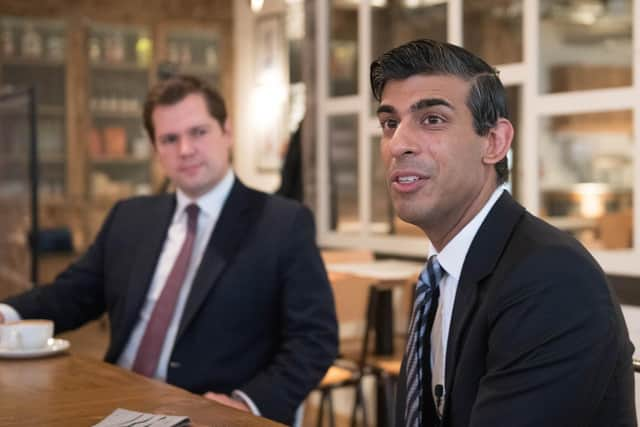People in Yorkshire could end up paying 'more for less' as council taxes rise but pandemic means services are cut, says Public Accounts Committee
English councils are facing holes in their budgets due to "over-optimism" from the Government about the impact of coronavirus, and ratepayers are having to pay an average of 4.3 per cent extra during 2021-22 in council tax bills, a Commons committee said.
Meg Hillier MP, chairwoman of the Public Accounts Committee (PAC), called the Government's approach "very concerning", while the Local Government Association pressed ministers to meet "all cost pressures and income losses incurred by councils as a result of the pandemic".


Advertisement
Hide AdAdvertisement
Hide AdIn North Yorkshire a senior councillor said it was "hard to have to go cap in hand to government for increases in funding" at a time when there such great inefficiencies in the system.
PAC's report published today - Covid-19: Local Government Finance - said sector representatives had told the committee "most councils will... need to make service cuts" as part of budgeting as England moves out of lockdown.
The MPs said: "The department's over-optimism about the impact of the pandemic on local authorities risks leading to reductions in services for local people.
"Local government sector representatives are clear that most councils will not be able to manage solely using reserves and will also need to make service cuts in 2021-22.
Advertisement
Hide AdAdvertisement
Hide Ad"We were told about many councils facing multimillion-pound budget reductions due to Covid-19, even after Government support.
"Typical council tax bills will rise by an average of 4.3% across England in 2021-22, meaning that local people could be paying more for less."
The 25-page document called for the Ministry of Housing, Communities and Local Government (MHCLG) to do more to understand the "service implications of current financial pressures".
It recommended that the department and the Treasury ensure the next Spending Review "includes full consideration of the longer-term effects of the pandemic on local government finance and the demands placed on local authorities".
Advertisement
Hide AdAdvertisement
Hide AdMs Hillier said: "MHCLG did step up to stave off a wave of council bankruptcies as a result of the pandemic, but the long-term health of the sector is still precarious.
"The over-optimism about the resilience of the sector is very concerning.
"MHCLG needs to be a better champion for local government within Whitehall."
County Councillor Gareth Dadd, North Yorkshire’s Deputy Leader and Executive Member for Finance and Assets said: “We agree that structural reform is needed for councils across the country.
Advertisement
Hide AdAdvertisement
Hide AdAs a start, Westminster would do well to abolish two-tier government across local authorities and all the waste and duplication that goes with it.
"Proposals for a unitary council solution are currently being considered by government for North Yorkshire and our bid delivers the maximum savings of £70m year on year. It has been hard to have to go cap in hand to government for increases in funding when there are such great inefficiencies in the system we have been required to administer.”
Communities Secretary Robert Jenrick is currently deliberating over whether local government in North Yorkshire should take the form of just one council covering the whole county or two authorities which include the City of York.
The committee praised Mr Jenrick's department for the scale of its intervention during the coronavirus crisis, noting that the £9.7 billion of increased costs and lost income faced by local authorities up to December 2020 were nearly matched by £9.1 billion of Government support.
Advertisement
Hide AdAdvertisement
Hide AdLocal authorities had to increase support after the March 2020 outbreak, paying grants to businesses, providing assistance to vulnerable people who were shielding, setting up community testing facilities and taking on the most challenging contact tracing, while keeping existing services running as they lost access to many of their revenue streams, MPs said.
But with council budgets already under strain pre-Covid, PAC said there were lessons to be learned from the response to the virus.
It said MHCLG needed a better understanding of the financial issues in city and town halls, and called for it to be "more transparent" with the National Audit Office about the "potential for Section 114 notices" - issued when a council effectively goes bust - to enable better scrutiny of issues thrown up when a council fails financially.
The committee also made the case for the long-delayed reform of council finances to be undertaken as part of the post-pandemic recovery.
Advertisement
Hide AdAdvertisement
Hide AdSharon Taylor, chairwoman of the LGA's resources board, said the committee was "right" to recognise the "significant financial package of support" given to councils.
She added: "This support will need to be kept under review and we continue to call on Government to meet, in full, all cost pressures and income losses incurred by councils as a result of the pandemic.
"Councils continue to face significant demand pressures on day-to-day services and income losses, such as from local taxation, fees and charges."
An MHCLG spokesperson said: “The Committee rightly recognise that we acted quickly and effectively to support councils during the pandemic - in total we have committed over £45 billion to help councils support their communities and local businesses.
Advertisement
Hide AdAdvertisement
Hide Ad“However, we reject their other claims and continue to work closely with councils to ensure they have the resources they need to deliver vital services for their communities – including access to an extra £2.3 billion this year.
“It is the responsibility of councils to manage their own budgets and they have all set balanced budgets for this year.”
Comment Guidelines
National World encourages reader discussion on our stories. User feedback, insights and back-and-forth exchanges add a rich layer of context to reporting. Please review our Community Guidelines before commenting.
